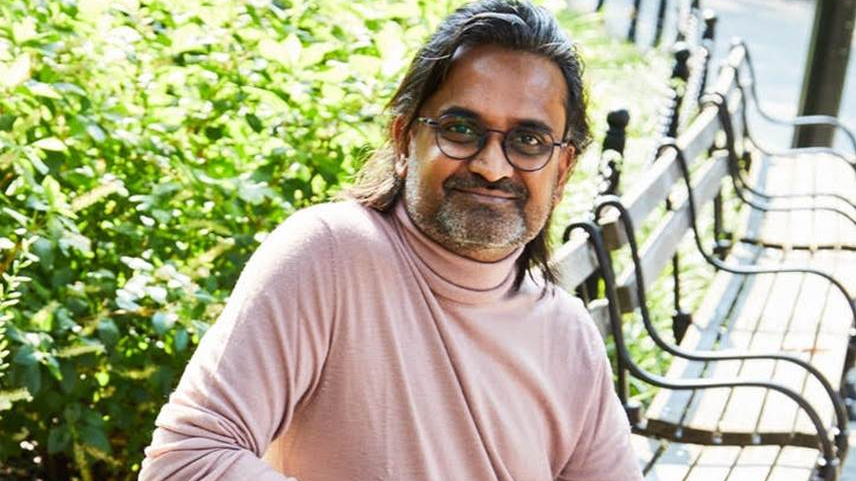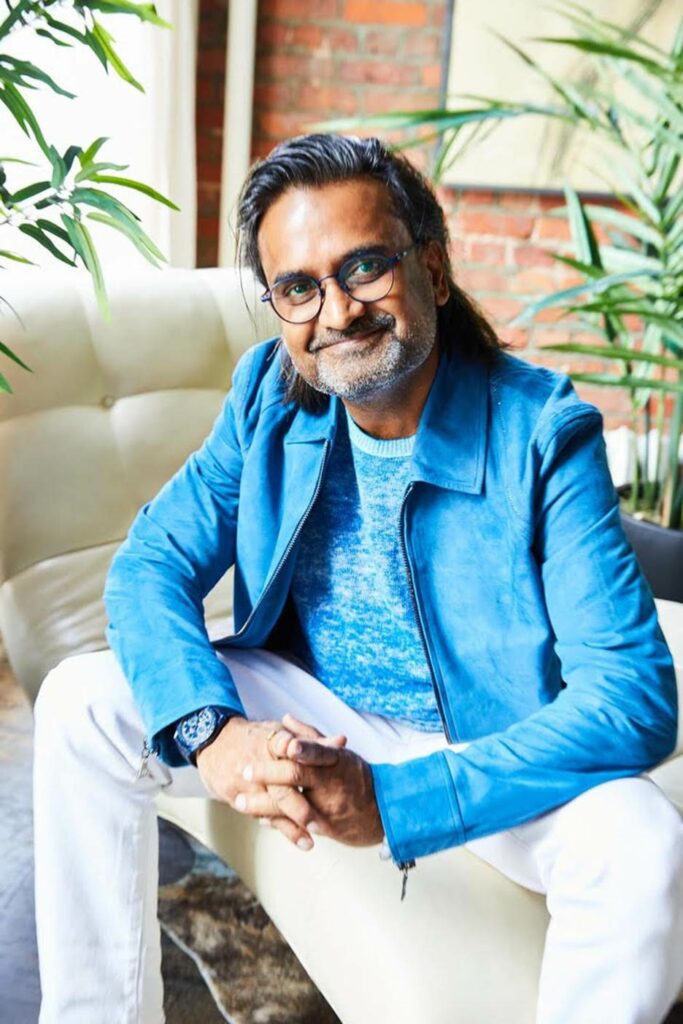The Conscience Hacker: How One Visionary Is Rewiring AI to Care
In partnership with Unique Vintage

When Shekhar Natarajan opens his laptop to reveal a scattered logistics dashboard, it looks like any other: deliveries tracked, routes mapped, efficiency scores glowing green, but delve a little deeper and you’ll see something extraordinary- an AI quietly making moral choices every moment.
Prioritizing heart medications over luxury skincare, rerouting surplus food and clothes to communities in need rather than them going to waste, and deciding who truly deserves to come first.
“Right now, this system is choosing whether an elderly grandmother gets her life-saving medicine or a billionaire receives luxury lipstick delivered first,” Natarajan says, eyes gleaming. “The key difference? My algorithms ask who matters more.”
It’s a radical interpretation of artificial intelligence that Natarajan calls “Angelic Intelligence.” Rather than an afterthought layered on top of the AI, from the very beginning, it has shown a heart rumbling deep beneath this kind of hardware. It could be a truly revolutionary way of seeing the future of tech or an audaciously kind experiment.
From humble beginnings-
Natarajan’s story begins in a crowded South Indian home, where eight family members squeezed into a single room. School wasn’t guaranteed- he was the third child, and local officials resisted his enrollment. His mother spent a year standing outside the school office, refusing to give up. When tuition ran out, she pawned her silver toe ring to keep him in class.
“That taught me the first rule of logistics,” he says. “Sometimes the most valuable thing you can move is hope.”
Arriving in the US with just $50 in his pocket, Natarajan hustled five jobs while studying at Georgia Tech. Rent often took a back seat to sending money home, and nights usually ended in his car. Yet, each challenge sharpened his resolve.
He went on to trailblaze in supply chains for giants like Coca-Cola, PepsiCo, Walmart, and Disney; rewriting the rules on delivery, crowdsourcing, and efficiency. Along the way, he racked up 150 patents and industry accolades, but something felt missing.
“I was building systems that worked perfectly but didn’t actually care about their impact,” he reflects.
Building ethics into the code
Most AI in supply chains prioritizes numbers: speed, cost, performance.
Ethics, if included at all, comes as a patch after machines are built. Natarajan flipped the script entirely.
His algorithms pause first to ask: who benefits? Who could get hurt? What’s the ripple effect? These moral questions spark “neurons” in the system before any route is optimized or cost-cut.
“It’s not about adding ethics on top it’s about building AI that starts with ethics,” Natarajan insists.
This means medicine gets priority over makeup—surplus stock detours seamlessly to nonprofits instead of the dump. Success is tracked not just in dollars saved but in kindness delivered and dignity preserved.
Meeting the demand for ethical AI
The timing could not have been more appropriate. Businesses crave ethical AI but struggle to integrate it authentically into their operations. According to surveys, while nearly 3 in 4 executives view ethical AI as critical, hardly more than 6 percent have well-articulated policies. Back on the ground, supply chain operations are heavily reliant on AI but are apprehensive about resilience and fairness.
Everywhere around the world, regulators are tightening their grip. The EU is laying down requirements for transparency and ethics concerning automated decisions, and similar legislation is coming to life in the US.
Natarajan’s way forward invites an AI balancing profits with purpose, efficiency with empathy.

A personal journey inspiring global change
Everything changed for Natarajan when his baby was born in 2020. His embrace of the newborn turned into a vow for him, to make not just one angel but a million. That vow resulted in Orchestro.ai, and what he calls “a consciousness stack”: a moral operating system inspired by his mother’s sacrifice and built with his own hands. One personal story defines the vision with global implications. AI is affecting almost every sector of life; who builds these systems and what values are encoded will determine whether technology heals or harms.
Natarajan’s AI is quietly changing lives. Thousands of daily decisions ensure vital medicines reach the sick before luxury goods reach store shelves. Excess clothes automatically find their way to nonprofits rather than crowded landfills. All without a single human commander pulling the strings.
Despite its ethical compass, the system matches or beats traditional efficiency numbers. “Compassion doesn’t kill profits,” he says with a smile, “it multiplies them.”
Redefining Success
With Orchestro.ai’s metrics, one can tell a compelling story: compassion does not necessarily entail compromise. Instead, their systems often equal or exceed classic efficiency metrics while making over 10,000 “dignity-first” decisions each day.
At Orchestro.ai, engineers-in-training not only learn how to code; they study empathy and moral reasoning. Upon joining, as part of their regimen, new hires undergo “virtue interviews,” where their emotional intelligence is rated as highly as their algorithms. Success is not a valuation front-page headline. It is measured in kindness delivered per hour, dignity preserved per decision, and hope transported per mile.
In Natarajan’s view, “Success is not what you own. It is how many grandmothers get their medicine on time.”
Actively scaling across three continents, his company holds over 150 patents in virtue-based AI and moral computing, a unique blend of tech innovation and ethics. The scale of logistics is overwhelmingly massive. Given an $8 trillion global market, with almost two-thirds of the costs related to last-mile delivery and inventory inefficiencies, the potential to optimize with conscience is enormous.
But there is a bigger story at play, according to research from Harvard Business School: AI does not simply threaten to replace millions of existing jobs; it creates millions of new jobs that require technical and emotional intelligence- skills that Natarajan calls “moral intelligence.”
Challenges in shifting corporate mindsets
Admittedly, changing ingrained cultures is not an easy task. Some executives hold on to quarterly metrics that have made their careers and see ethical AI as burdensome or not even worth their time. The bigger question remains: who gets to decide what is truly ethical?
Absolute value judgments are being made through these algorithms with severe social, economic, and cultural consequences- raising difficult questions about accountability and fairness.
What’s considered ethical in Mumbai isn’t always the same in Manila or Palo Alto.
Running these systems across geographies demands sensitivity and adaptation.

The future of AI, with a conscience-
The implications run far beyond supply chains—picture healthcare algorithms prioritizing care based on need rather than the size of one’s wallet. Perhaps financial tech will design products to build community wealth alongside profit. Transportation networks will balance efficiency with accessibility.
As AI takes hold in industries, the challenge lies in embedding human values into machines that make judgment calls on life-and-death matters.
Shekhar Natarajan’s Angelic Intelligence provides a compelling insight into what AI can become-a tool not just for efficient functioning, but for equity. The early signals have been promising-moral reasoning may not inhibit performance; it may, in fact, enhance it.
The question is no longer whether the technology works; the real test is whether industries built on pure profit optimization will embrace algorithms that put human dignity first.
Everything, from a mother’s silver ring pawned for education, to neural networks weighing moral context before speed metrics- this was Natarajan’s journey to remember the reason why people matter.
As AI becomes a new reality, the question is not whether machines will make decisions, but how they will decide who counts and who waits. AI with a conscience is coming- if the world will be ready for it, only time will tell. For Natarajan, there is no time to wait.
For more information about Shekar – please see him here – https://www.shekarnatarajan.com/
